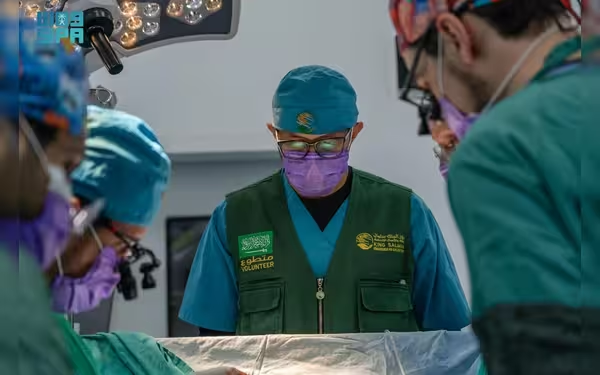Saturday, November 16, 2024 07:47 PM
KSrelief Medical Outreach in Kyrgyzstan and Yemen
- KSrelief conducts cardiac surgery campaign in Kyrgyzstan.
- Emergency medicine training enhances local volunteer skills in Yemen.
- Collaboration with WHO aims to improve healthcare services.
 Image Credits: arabnewspk
Image Credits: arabnewspkKSrelief enhances healthcare in Kyrgyzstan and Yemen through medical outreach and volunteer training initiatives.
In recent years, humanitarian efforts have gained significant momentum across the globe, particularly in regions facing medical challenges. One such initiative is being led by the Saudi aid agency KSrelief, which is actively working to provide essential medical services in Kyrgyzstan and Yemen. These outreach programs are crucial as they not only address immediate health needs but also contribute to the long-term well-being of communities.
Currently, in Bishkek, Kyrgyzstan, KSrelief is conducting a week-long cardiac surgery and catheterization campaign. This initiative is particularly noteworthy as it involves volunteer specialists who are performing life-saving procedures. So far, three open-heart surgeries and 28 catheterizations have been successfully completed. This campaign is set to continue until November 16, providing hope and health to many individuals in need.
Meanwhile, in Aden, Yemen, KSrelief is focusing on enhancing the skills of local volunteers through emergency medicine training. A total of 134 individuals have received training in cardiopulmonary resuscitation (CPR), while an additional 10 participants have been trained in advanced cardiovascular life support. This training is vital as it empowers local communities to respond effectively in medical emergencies, potentially saving lives.
In a related development, Dr. Abdullah Al-Moallem, the director of KSrelief’s health and environmental aid department, recently hosted a delegation from the World Health Organization (WHO) in Riyadh. During this meeting, discussions were held with Hans Kluge, WHO’s regional director for Europe, regarding the expansion of their partnership. Such collaborations are essential for enhancing healthcare services and ensuring that patients in Europe and beyond receive the best possible care.
The ongoing medical outreach initiatives by KSrelief in Kyrgyzstan and Yemen highlight the importance of international cooperation in addressing health challenges. By providing essential medical services and training, these efforts not only improve immediate health outcomes but also foster a sense of community resilience. As we witness these positive changes, it becomes clear that every effort counts in the journey towards better health for all.













